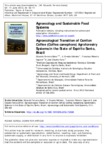Use este identificador para citar ou linkar para este item:
http://biblioteca.incaper.es.gov.br/digital/handle/item/491Registro completo de metadados
| Campo DC | Valor | Idioma |
|---|---|---|
| dc.contributor.author | SALES, E. F. | pt_BR |
| dc.contributor.author | MÉNDEZ, E. V. | pt_BR |
| dc.contributor.author | CAPORAL, F. R. | pt_BR |
| dc.contributor.author | FARIA, J. C. | pt_BR |
| dc.contributor.other | Eduardo Ferreira Sales, Incaper; V. Ernesto Méndez, Universidade de Córdoba; Francisco Roberto Caporal, University of Vermont; José Cláudio Faria, Universidade Estadual de Santa Cruz. | pt_BR |
| dc.date.accessioned | 2015-01-09T10:44:43Z | - |
| dc.date.available | 2015-01-09T10:44:43Z | - |
| dc.date.created | 2013 | pt_BR |
| dc.date.issued | 2013-10-07 | pt_BR |
| dc.identifier.issn | 2168-3565 | pt_BR |
| dc.identifier.other | 663 | pt_BR |
| dc.identifier.uri | http://biblioteca.incaper.es.gov.br/digital/handle/item/491 | - |
| dc.description | Coffee is a very important product in the State of Espírito Santo, Brazil, and most of it is planted as unshaded coffee monocultures, with few growers managing shaded coffee agroforestry systems (AFS). To analyze the opportunities and challenges associated with coffee agroforestry management, we conducted 58 semistructured interviews with coffee growers. In addition, we conducted a field investigation that tested production of Coffea canephora with the shade trees Australian Cedar (Toona ciliata), Jequitibá (Cariniana legalis), and Teak (Tectona grandis). Of the 58 interviewed farmers, 64% (37) were satisfied with the AFS. One of the main factors that caused satisfaction was obtaining income from sources other than coffee. Unsatisfied farmers mentioned the competition between shade trees and coffee shrubs. Cedar was the shade tree that grew most and reduced coffee production, while the combination with Jequitibá maintained more stable yields. We conclude that the higher the growth rate of trees, the higher the negative impact on the coffee production in the study areas. | pt_BR |
| dc.language | en | pt_BR |
| dc.publisher | Agroecology and Sustainable Food Systems, vol. 37, Issue 9, 2013. | pt_BR |
| dc.subject | Sistemas Agroflorestais | pt_BR |
| dc.subject | Espírito Santo | pt_BR |
| dc.subject | SAFs | pt_BR |
| dc.subject | Café Conilon | pt_BR |
| dc.title | Agroecological Transition of Conilon Coffee (Coffea canephora) Agroforestry Systems in the State of Espírito Santo, Brazil. | pt_BR |
| dc.type | Artigo de periódico (quando a biblioteca tiver o título do periódico) | pt_BR |
| dc.ainfo.id | 623 | pt_BR |
| dc.ainfo.lastupdate | 2015-01-09 | pt_BR |
| dc.ainfo.depositante | Merielem Frasson | pt_BR |
| dc.identifier.doi | 10.10 80/10440046.2012.712633 | pt_BR |
| Aparece nas coleções: | Memória Técnica do Incaper  | |
Arquivos associados a este item:
| Arquivo | Descrição | Tamanho | Formato | |
|---|---|---|---|---|
| Artigo-Journal-2013-Eduardo-Sales.pdf | 859,43 kB | Adobe PDF |  Visualizar/Abrir |
Os itens no repositório estão protegidos por copyright, com todos os direitos reservados, salvo quando é indicado o contrário.
